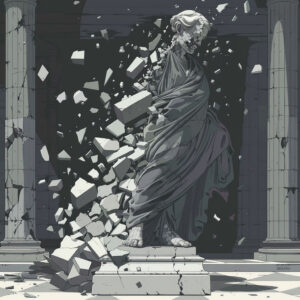 In the previous essays in this series, I looked at the invention of race and addressed the general topic of what to do about racist philosophers of the Modern Era. This essay ends the series with a discussion of my assessment of the philosophers I include in my class. In engaging in this assessment, I sought out the most critical of credible assessments of the philosophers.
In the previous essays in this series, I looked at the invention of race and addressed the general topic of what to do about racist philosophers of the Modern Era. This essay ends the series with a discussion of my assessment of the philosophers I include in my class. In engaging in this assessment, I sought out the most critical of credible assessments of the philosophers.
I start the class with Thomas Hobbes (1588-1679). His Leviathan was published in 1651, long before Linnaeus’ book and twenty-five years before Bacon’s Rebellion. This means that Hobbes was unlikely to have been aware of the developed modern conception of race. Barbara Hall undertook an extensive analysis of Hobbes’ writings in search of evidence of possible racism. Hall finds no obvious inconsistencies between his philosophical views and his life that would reveal him as a racist and a hypocrite. Hall also finds little in his writings for or against slave trade and the European expansion in the New World. In defining racism, Hall presents the notion that a person can be considered a racist for “failing to confront racist institutions or policies and practices as surely as if they had positively acted to enforce them.” Even if this broad definition of racism is accepted, a critic should take care to note what version of racism a person is being accused of. There is, after all, an important moral distinction between being actively engaged in wrongdoing and simply failing to confront such wrongdoing.
Based on the available evidence, Hall seems to be right that Hobbes did not confront racism in his time. But there is the question of whether his failure to act (even in writing) makes him a racist. This falls under the broader moral debate about whether failing to act against an evil makes one morally accountable for that evil. While Hobbes could be justly accused of allowing evil to occur, there is no evidence that he assisted in the evils of racism or that he held what could be considered racist views. As such, Hobbes can be, at worst, only weakly condemned as a passive racist for failing to act against a system now recognized as racist.
Hall also infers that Hobbes would likely have sanctioned the slave trade and would have likely justified the conquest of the New World. But, as Hall admits, there seems to be nothing in Hobbes writing that explicitly does either. I would argue that this speculation is not sufficient to convict Hobbes. While not an Appeal to Ignorance, the inference is extremely weak. After all, a person should not be convicted based on speculation about what they might have done. When I teach Hobbes, I do note that he do not condemn the slave trade while also noting that there seems to be no racist content in his work.
After Hobbes, the class moves on on Rene Descartes and Princess Elisabeth. While there might be some undiscovered letters or writings by Descartes, his philosophical works and correspondence reveal that he “names race never and slavery twice.” There is no evidence that he condemned racism or the slave trade, so it could be argued, as Timoty Reiss does, that he was complicit in both. There are also those who contend that his ideas, such as dualism, were used to advance racist ends and that this serves as evidence of his racism.
While the issue of whether his ideas were used for racist ends can be debated, there is the question of whether this use would prove a philosopher is racist. On the face of it, if the ideas presented by the philosopher do not seem racist and there is no evidence that they intended them to be used to advance or defend racism, then it would seem absurd to hold them accountable for how their ideas were used by others. To use an analogy, the Wright brothers hoped that their airplane would make war practically impossible. To claim that they are accountable for the use of airplanes in war or other acts of violence would thus be a mistake. As an extreme example, claiming that the Wright Brothers were terrorists because the 9/11 attackers used an airplane would obviously be absurd. As such, unless one can show the racism in Descartes own writings, what others used his ideas for is irrelevant to whether he was a racist or whether his ideas are racist in and of themselves.
I include in my class the correspondence between Descartes and Princess Elisabeth of Bohemia. Elisabeth’s correspondence does not seem to indicate racism on her part, but she does not seem to strongly condemn the slave trade or racism in general. As such, some would contend that she was complicit in both for failing to do so. I do note that she did not address these matters, but her philosophical works don’t have any racism to address. Somewhat ironically, she does seem to make a sexist claim about how being a woman would have a negative impact on her reasoning, something Descartes immediately rejects. This make sense as Descartes is a metaphysical dualist and regards the incorporeal substance as the substance that thinks.
After Descartes and Elisabeth, I turn to the Ethiopian philosopher Zera Yacob. When Yacob was alive, slavery was widely practiced in Ethiopia. Yacob condemned the religious argument used to justify slavery, advancing an argument based on the principle that all men were created equal by God. As such, while he lived in a society that accepted slavery, his condemnation of it and his principle of equality show that he was not a racist.
Bennedict Spinoza, perhaps because he is less well known, has not often been accused of being a racist. Michael Rosenthal does note that Spinoza wrote of a dream about a “black, scabby Brazilian” and considers that this might be “a sign of the incipient struggle against prejudice.” There does not seem to be any written evidence that Spinoza specifically condemned the slave trade or racism. He does write about human bondage in his philosophical works, but this is not about slavery in the usual sense. Rather, he focused on how people are chained by their emotions and their lack of believing Spinoza’s philosophy. Spinoza does argue for pantheism (that everything is God and God is everything) and what impact this might have on the possibility of racism would be an interesting topic (could God be racist towards Himself?).
Gottfried Leibniz does face some accusations of racism. He read Jesuit accounts of Chinese philosophy and noted the apparent correspondence between binary arithmetic and the I Ching, or Book of Changes. The I Ching uses broken and unbroken lines as symbols, which intrigued him. What usually gets him accused of racism is that he claimed the West had the advantage of Christian revelation and was superior to China in the natural sciences. But he said of the Chinese that “certainly they surpass us (though it is almost shameful to confess this) in practical philosophy, that is, in the precepts of ethics and politics adapted to the present life and the use of morals.” Based on such remarks, John Harfouch argues that Leibniz was a founding figure of the racism known as “orientalism.” Leibniz’ defenders note that he seems to be expressing a religious and cultural bias rather than engaging in racism in the current sense of the term.
It is almost certain that Leibniz met Amo (also known as Anton Wilhelm). Amo was kidnapped from Africa but became a German philosopher. There does not appear to be any evidence that Leibniz expressed racist views towards Amo and there is evidence of Leibniz’ influence on Amo’s philosophy. Julia Jorati argues that Leibniz condemned slavery on the grounds that it violates natural law and is thus morally impermissible. While I do note Leibniz’s remarks about China, there is currently nothing else to say about him in the context of racism.
The English philosopher John Locke is often accused of racism on three counts. The first is that white supremacy has Lockean roots. This raises the usual questions of whether it is true and whether a philosopher is accountable for how others use (or misuse) their views. Locke’s political philosophy seems to oppose racism. For example, Locke argues that God created everyone equal and that attempts to enslave people justify killing the would-be slaver. While some current white supremacists might profess to have Lockean views, they would need to ignore key parts of his philosophical writings.
The second is that Locke is claimed to be the author of The Fundamental Constitutions of Carolina in 1669. This document supports both hereditary nobility and slavery. Locke’s defenders point out that Locke merely drafted the documents as a lawyer and that he explicitly condemns both hereditary nobility and slavery in his philosophical writing.
The third is that Locke owned stock in the The Royal African Company which ran the African slave trade for England. Locke was the secretary of Shaftsbury, who Charles II put in charge of the Council of Foreign Plantations. This made Locke the Council’s official clerk and Locke was paid in Royal African Company stock. But both Locke and Shaftsbury soon opposed Charles II and both sold their stock in the company. Thus, while Locke did profit from slavery, he ended up divesting from the company that ran the English slave trade. And, as noted above, he argued that an attempt to enslave a person warrants responding with lethal force.
In the case of George Berkeley, there is no debate about his racism. On October 4, 1730 Berkeley purchased “a negro man named Philip aged 14 years or thereabout” and somewhat later, he purchased “a negro man named Edward aged 20 years or thereabouts. “In 1731 “Dean Berkeley baptized three of his negroes, ‘Philip, Anthony, and Agnes Berkeley.” Berkeley justified slavery as a path for conversion to Christianity. While, as noted above, some people defend historical figures by asserting that they were just products of their time, Berkeley’s contemporary, Francis Hutcheson, explicitly argued against slavery. Berkeley also wrote disparagingly of Irish peasants, showing that he also embraced classism. Since Berkeley is an important philosopher, I keep him in my class. I do note his ownership of slaves, but these views do not appear to have influenced his metaphysics and epistemology. That is, his metaphysical idealism (that all that exists is mental in nature) does not seem racist.
While the feminist Mary Wollstonecraft has been praised for her feminism, she has been condemned as a racist. Claire Hynes criticizes Wollstonecraft for comparing women to objectified slaves and Moira Ferguson argues Wollstonecraft fought for the enfranchisement of white women but did so while dehumanizing black women and men. That they ignore (or are even hostile to) people of color is a charge made against some white feminists today. There are those, such as Rachel Elizabeth Cargle, who contend that sometimes feminism can be white supremacy in heels. When discussing Wollstonecraft I take the opportunity to discuss the complicated nature of feminism. The charge against her also links the discussion to current concerns and this helps show the students the relevance of dead philosophers to issues of today.
I had long thought of David Hume as being a basically decent fellow, but he has proved to be a disappointment. Felix Waldman argues that David Hume was a racist involved in the slave trade. As evidence for Hume’s involvement in slavery, Waldman points to a letter that was unknown to scholars until 2014. In this 1766 letter Hume urged his patron Lord Hertford to buy a slave plantation in Grenada. Hume facilitated the purchase by writing the French governor of Martinique in 1766 and Hume lent £400 to one of the principal investors. Hume did, however, denounce slavery. In ancient Rome.
Hume’s philosophy of racism is proven by his essay Of National Characters:
I Am apt to suspect the negroes to be naturally inferior to the whites. There scarcely ever was a civilized nation of that complexion, nor even any individual eminent either in action or speculation. No ingenious manufactures amongst them, no arts, no sciences. On the other hand, the most rude and barbarous of the whites, such as the ancient Germans, the present Tartars, have still something eminent about them, in their valour, form of government, or some other particular. Such a uniform and constant difference could not happen, in so many countries and ages, if nature had not made an original distinction between these breeds of men. Not to mention our colonies, there are Negroe slaves dispersed all over Europe, of whom none ever discovered any symptoms of ingenuity; though low people, without education, will start up amongst us, and distinguish themselves in every profession. In Jamaica, indeed, they talk of one negroe as a man of parts and learning; but it is likely he is admired for slender accomplishments, like a parrot, who speaks a few words plainly.
In 1770 James Beattie of Aberdeen ably criticized Hume’s racist views. Hume seems to have been unmoved by this criticism and the last authorized edition of the essay, in 1777, is essentially unchanged. Beattie’s detailed refutation of Hume’s racist claims serves as evidence that philosophers of this time could (and did) reject racism and that other philosophers would have been aware of such arguments. This helps undercut the defense that the racism of philosophers can be excused because of ignorance or that they are products of their time. Because of the importance of Hume’s philosophical works, I do keep him in my class while also noting his explicitly racist claims. While Hume is a clear-cut case, Immanuel Kant is more complicated.
Pauline Kleinfeld presents a reasonable case that Kant held both sexist and racist views. Kant did write, for example, that blacks have “by nature no feeling that rises above the ridiculous.” He also wrote that the native American population is “incapable of all culture.” In addition to his own alleged racism, Kant has been accused of helping lay the theoretical foundations of European racism: he writes explicitly about race and about classifying people into different races.
Daniel-Pascal Zorn offers a defense of Kant. While Zorn agrees that Kant expresses himself in a discriminatory manner, Zoren argues that the racist premises are more likely those of his interlocutors (Hume and Forster). Kant, Zorn claims, argues against these premises in favor of the unity of humanity. Kant’s ethical theory also seems inconsistent with racism, since that would involve treating people as means rather than ends. While Kant certainly seems to have held some discriminatory views, his philosophical importance means that he retains a place in my class.
 Put roughly, vegetarians are defined by their refusal to eat meat. Vegans take it further and refuse to eat any animal products. There are, as vegetarians and vegans will tell you, many varieties of each and some involve nuances about what is and is not acceptable to eat. For example, some vegans will consume honey while others will not. While this oversimplifies things, people tend to embrace these views for two broad reasons. Moral vegans/vegetarians are motivated by the belief that it is morally wrong to harm animals. Some also consider the total harm arising from the use of animals as products, such as the environmental damage and wastefulness of animal farming. The second reason is health. Some vegans/vegetarians are motivated by concerns about their physical well-being; they think consuming animal products is unhealthy. It is obviously possible to have both (and other) motivations, but I will focus on ethics in context of defining meat.
Put roughly, vegetarians are defined by their refusal to eat meat. Vegans take it further and refuse to eat any animal products. There are, as vegetarians and vegans will tell you, many varieties of each and some involve nuances about what is and is not acceptable to eat. For example, some vegans will consume honey while others will not. While this oversimplifies things, people tend to embrace these views for two broad reasons. Moral vegans/vegetarians are motivated by the belief that it is morally wrong to harm animals. Some also consider the total harm arising from the use of animals as products, such as the environmental damage and wastefulness of animal farming. The second reason is health. Some vegans/vegetarians are motivated by concerns about their physical well-being; they think consuming animal products is unhealthy. It is obviously possible to have both (and other) motivations, but I will focus on ethics in context of defining meat.
 While lab-grown meat is a staple chow in science fiction, researchers
While lab-grown meat is a staple chow in science fiction, researchers  While the consumption of meat has long been a part of the endless culture war, a new front has opened–the insects and lab-grown meat battlefield. In May of 2024 my adopted state of Florida passed a law prohibiting the sale of lab-grown meat. Governor DeSantis’ website made the announcement, asserting that Florida
While the consumption of meat has long been a part of the endless culture war, a new front has opened–the insects and lab-grown meat battlefield. In May of 2024 my adopted state of Florida passed a law prohibiting the sale of lab-grown meat. Governor DeSantis’ website made the announcement, asserting that Florida  A stock argument against raising the minimum wage is built on the claim doing so would hurt small businesses. This argument has some merit. While companies like Amazon and McDonalds could increase employee wages while still making a massive profit for upper management and shareholders, a small business that is barely making a profit could be hard pressed to increase wages without running at a loss.
A stock argument against raising the minimum wage is built on the claim doing so would hurt small businesses. This argument has some merit. While companies like Amazon and McDonalds could increase employee wages while still making a massive profit for upper management and shareholders, a small business that is barely making a profit could be hard pressed to increase wages without running at a loss. In the previous essays in this series, I looked at the invention of race and addressed the general topic of what to do about racist philosophers of the Modern Era. This essay ends the series with a discussion of my assessment of the philosophers I include in my class. In engaging in this assessment, I sought out the most critical of credible assessments of the philosophers.
In the previous essays in this series, I looked at the invention of race and addressed the general topic of what to do about racist philosophers of the Modern Era. This essay ends the series with a discussion of my assessment of the philosophers I include in my class. In engaging in this assessment, I sought out the most critical of credible assessments of the philosophers. In the previous essays in this series, I looked at the invention of race and some defenses offered against charges of racism directed at Modern era philosophers. In this essay, I’ll discuss the subject of what to do when a Modern era philosopher has been proven to be a racist. This would also apply, in some cases, to philosophers of other eras, including today.
In the previous essays in this series, I looked at the invention of race and some defenses offered against charges of racism directed at Modern era philosophers. In this essay, I’ll discuss the subject of what to do when a Modern era philosopher has been proven to be a racist. This would also apply, in some cases, to philosophers of other eras, including today.